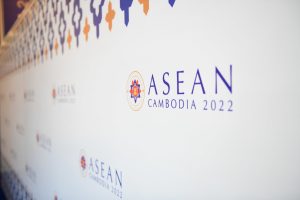When Southeast Asian leaders meet at this week’s Association of Southeast Asian Nations (ASEAN) Summit, they will confront a daunting agenda, including the Russia-Ukraine war, the disputes in the South China Sea, and the intensifying strategic competition between China and the United States. But as important as any of these agenda items, in its potential impact on ASEAN if not its global import, is the question of how they will handle the escalating crisis in Myanmar.
The country has been in a state of turmoil since the country’s military seized power in February 2021, toppling the elected National League for Democracy (NLD) government and terminating a decade-long experiment in limited political opening. The country is now economically dysfunctional and wracked by a conflict that pits the military junta led by Senior Gen. Min Aung Hlaing against an array of opponents.
In the nearly two years since the coup, ASEAN’s approach to Myanmar’s troubles has been roundly criticized. The bloc’s diplomacy has been guided by the Five-Point Consensus, a loose peace framework that was agreed upon at a special summit in Jakarta in April 2021. The agreement called for an immediate cessation of violence, and talks involving “all parties” to the country’s conflict. It also called for the delivery of humanitarian aid to those in need, and for the appointment of a special envoy to mediate the conflict.
The problem with the Consensus, as I’ve pointed out before, was its assumption that the military junta, having signed the agreement, would seek to implement it in good faith. Instead, it has made a mockery of both the letter and spirit of the agreement, seeking to crush its opponents with savage force, while refusing to treat any of them as legitimate partners of dialogue. The junta’s claim that it will implement the Consensus once it has defeated these “terrorists” and restored “stability” to the country is tantamount to an admission that it is not, and has never been, willing to implement the agreement.
As the months have gone by and the gap between what the Consensus assumed and what it has delivered has widened further, frustration has grown among ASEAN’s member states, particularly Malaysia and Indonesia.
In particular, the military government’s execution of four pro-democracy activists in late July, just before an ASEAN Foreign Ministers’ Meeting, was about the clearest sign the junta could offer of its true intentions. In the joint communique released after the meeting, the bloc’s foreign ministers recommended that the military administration’s cooperation with the Five-Point Consensus be reviewed at this month’s ASEAN Summit, in order “to guide the decision on the next steps.”
Malaysia’s Foreign Minister Saifuddin Abdullah, a straight-shooter by ASEAN standards, has led the push for a more robust policy, advocating talks with the opposition National Unity Government (NUG) and suggesting that the Five-Point Consensus might be dropped.
“Between now and the ASEAN summit in November ASEAN must seriously review if the Five-Point Consensus is still relevant, and if it should be replaced with something better,” Saifuddin said back in September. “By the time we meet in November, we must ask that hard question and we must have the answer during that time.”
Now that the summit is upon us, the question must be asked: Is ASEAN ready to ask hard questions about its approach toward Myanmar?
The indications so far are not encouraging. At a special foreign ministers’ meeting held late last month, leaders acknowledged that their efforts to bring peace to Myanmar haven’t succeeded but stated that they remained committed to the Five-Point Consensus. They called for “concrete, practical, and time-bound actions” by Myanmar’s military to implement the plan.
This side-stepping of the fundamental flaw in the Consensus – the assumption that the military is or can be a genuine partner for peace – suggests that the upcoming summit is unlikely to result in stronger actions. It doesn’t help that Saifuddin, the most outspoken advocate of a fresh approach, will not be attending this year’s ASEAN meetings because he will be campaigning ahead of Malaysia’s general election on November 19.
To be sure, in the face of the junta’s obduracy, there is only so much that ASEAN can do, especially when one considers its doctrine of “non-interference” in the internal affairs of member-states. As Indonesian Foreign Minister Retno Marsudi said in a recent interview, “The criticisms shouldn’t be aimed at ASEAN. They should be aimed at the junta. If we’re talking about who’s to blame, who’s failed, it’s not us, it’s not ASEAN. We did our part.”
It may well be true that no outside power has any real leverage over the Myanmar armed forces, which have shown over decades that they are willing to endure long periods of isolation in pursuit of their goals, rather than cave into outside pressure. It is also probably unrealistic to expect ASEAN to take the temperamentally divergent path of isolating and imposing sanctions on the military junta, as many Western nations have done.
However, there is certainly more that ASEAN can and should do to communicate its grave concern about the events in Myanmar – even if only to offset the growing international perception that it is unable to provide leadership on issues in its own backyard. This could perhaps involve a provisional suspension of Myanmar’s membership in ASEAN, or, as Saifuddin has advocated, an open engagement with the NUG as a key party to the country’s conflict.
For now, all indications are that a more robust ASEAN position will have to wait until Indonesia assumes the chairmanship of the bloc in 2023.

































